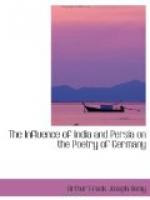On the poetry of the Schlegels their Oriental studies exercised very little influence. Friedrich translated some maxims from the Hitopadesa and from Bhartrhari;[128] August likewise translated from the same works, as well as from the Epics and Puranas.[129] There are only two original poems of his that have anything to do with India, and both of these were written before he had begun the study of Sanskrit. The first is “Die Bestattung des Braminen,"[130] a somewhat morbid description of the burning of a corpse. It was addressed to his brother Karl August, who had joined a Hanoverian regiment in the service of the East India Company. The second of these poems is “Neoptolemus an Diokles” (ii. 13), written in 1800, and dedicated to the memory of this same brother who had died at Madras in 1789.[131] As a matter of fact, there is really nothing Oriental in the spirit of the poem.
Aside from translations, the only poems that are connected with Schlegel’s Sanskrit studies, are the epigrams against his illustrious contemporaries, Bopp and Rueckert. Those against the former (ii. 234) are of no special interest here. With those against Rueckert, however, the case is different. It is worth while noting that towards the distinguished scholar-poet Schlegel assumed a patronizing attitude. To Rueckert’s masterly renderings from Sanskrit literature he referred slightingly as “Sanskritpoesiemetriknachahmungen” (ii. 235). But when he hailed the younger poet as
Aller morgenlaend’schen
Zaeune Koenig,
Wechselsweise zeisigkranichtoenig!
(ii. 218),
he came much nearer to the truth than he imagined at the time. For, while it will be conceded that Rueckert did not always sing with equal power, it also is indisputable that he is the leading spirit in the movement under investigation. But we shall not anticipate a discussion of this poet’s work, which is reserved for a succeeding chapter.
FOOTNOTES:
[125] See Benfey, Gesch. der Sprachwissenschaft und orient. Philologie in Deutschland, Muenchen, 1869, pp. 361-369.
[126] The sloka, the tristubh and the jagati metre are described, the last two, however, not by name. Narada’s speech, p. 236, is in sloka, 16 syllables to the line; the first distich, p. 233, is in tristubh, 22 syllables to the line. Quantity of course is ignored.
[127] See Benfey, op. cit. pp. 379-405.
[128] Friedr. Schlegel, Saemmtliche Werke, Wien, 1846. vol. ii. p. 82 seq.
[129] Aug. W. Schlegel, Saemmtliche Werke. Leipz. 1846. vol. iii. p. 7 seq.
[130] Ibid. i. p. 82.
[131] Friedr. Schlegel, Weisheit der Indier, pref. pp. xii, xiii. See also prefatory remarks to the poem in question.
CHAPTER VII.
PLATEN.
His Oriental Studies—Ghaselen—Their
Persian
Character—Imitation
of Persian Form—Translations.




